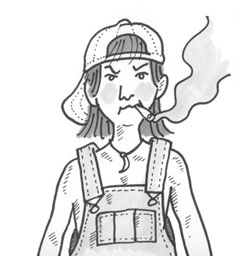Question:

Thanks,
John
Answer:
Dear John,
I can empathize totally with you on this one. I have a child who engaged in all the behaviors you describe. For a while I became very ego-involved. I was very concerned about what people would think about the "son" of the author of Positive Discipline. For a short while, I threw the books out the window and became very controlling and punitive (the opposite of all I write and lecture about). Of course, things got worse.
Fortunately, I went to a workshop given by my colleague, Lynn Lott. I knew she could help me get "back on track," so I asked her to write a book with me. I knew that if I could make things work for me, I could share these ideas with others. The resulting book is Positive Discipline for Teenagers. I am pleased to tell you that, even though it wasn't easy, the concepts we talk about in this book were very effective. My formerly rebellious son (it got so bad he went into a drug treatment program) graduated with a degree in mechanical engineering.
Of course, I can't relate the whole book here, but I will give you a few hints:
- Control and punishment do not work with teenagers. As parents, we get very scared when we see the dangers in the world for teenagers. We are fearful that our rebellious children will ruin their lives forever. When we try to stop the rebellion through control and punishment, even though we have good intentions, we only make things worse. Control invites rebellion either overt or covert.
- Many people think the only alternative to control and punishment is permissiveness. Permissiveness is not healthy for children nor for adults.
- Demonstrate kindness and firmness at the same time. Kindness translates to conveying a feeling of unconditional love to your child. Firmness with teenagers often means deciding what YOU will do instead of what you will try to make THEM do. (At one point, I said to my son,"If you go to jail, I will love you and I will bring you cookies; but I will not bail you out.")
- Have faith in your child and her ultimate goodness and her ultimate ability to work things out. Teach her that mistakes are wonderful opportunities to learn and that it is never too late to learn. Let her know about your love and your concerns (without lecturing), and let her know you are there to listen if she ever feels like talking. Then LISTEN if she takes you up on it.
- Have family meetings or joint problem-solving sessions. During this time, identify problems, and brainstorm on solutions that work for everyone by mutual agreement. If your daughter refuses to cooperate in joint problem-solving, that is a sign of an extremely damaged relationship. Sometimes you need to stop dealing with problems until you can build the relationship by conveying unconditional love. In our book, "Positive Discipline for Teenagers," I strongly suggest you read Chapter 8, "The Magic of Time That Counts." Lynn and I believe that if people would read that chapter and "get it," the rest of the book would be unnecessary.
- Learn to let go without abandoning. We wish we could get parents of teens to understand that by this age control is too late. The more parents control, the more teenagers sneak around. When you give up control, and get across the message of unconditional love, then you can still have influence.
- Focus on long-range parenting results instead of short-term control. Rebellion is the job of teenagers. It is called individuation. Individuation means trying to find out who they are separate from their parents. How can they find out if they don't question parental rules and values? We know many teenagers who did not rebel when they were at home, but "party" like crazy when they get into college. Others never rebel and become "approval junkies." Approval junkies have lost their sense of self and spend their lives trying to prove their worth by pleasing others.
I'm not trying to make light of rebellion. There is healthy rebellion and unhealthy rebellion. Often parents can't tolerate even healthy rebellion (such as the clothes they wear, their sullen attitudes, their lack of interest in spending time with the family, messy rooms, hours on the phone, etc.) and push their kids into more destructive rebellion because of parental disapproval, control, and punishment. Children usually come back to most of their parents' values if they have been treated with kindness, firmness, and faith in their ultimate goodness during their rebellion.
I know what a difficult time this is for you. It is hard to watch our children do things we know are not good for them. Hopefully you made a few mistakes of your own when you were a teenager and you turned out all right, didn't you? Remember those days and show understanding and faith.
I wish you the best,
Jane Nelsen

